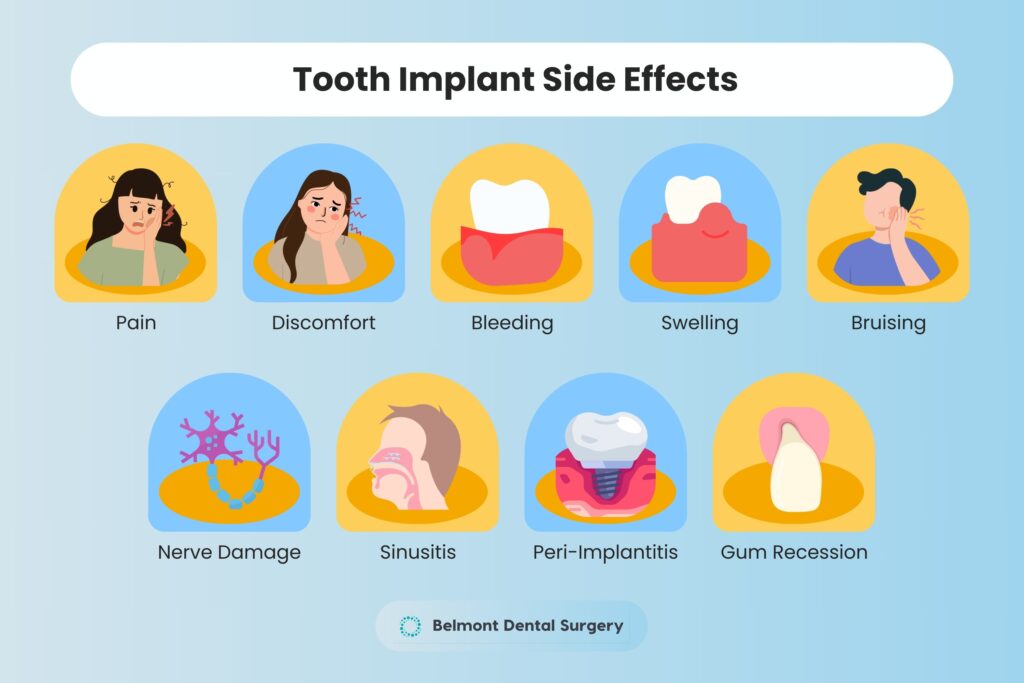
Image Source: Belmont Dental Surgery
Dental implants are a revolutionary solution for those seeking to replace missing teeth, offering a more permanent and natural-looking alternative to dentures or bridges. However, like any medical procedure, dental implants can come with their own set of challenges. Understanding these common dental implant problems is crucial for anyone considering this option, as it helps in making informed decisions and preparing for any potential issues.
One of the primary concerns with dental implants is the possibility of complications that can arise either during the procedure or afterward. These complications can range from minor discomfort to more severe issues that may require additional treatment. Being aware of these potential problems not only helps in their early identification but also in understanding how to prevent them.
Moreover, it’s essential to recognize that while dental implants have a high success rate, they are not suitable for everyone. Factors such as bone density, overall health, and oral hygiene can significantly impact the success of an implant. Therefore, a comprehensive understanding of common dental implant problems can help potential candidates weigh the benefits against the risks.
Overview of Dental Implants: Procedure and Benefits
Dental implants involve a surgical procedure where a titanium post is placed into the jawbone to act as an artificial tooth root. This post then supports a crown, bridge, or denture, effectively replacing the missing tooth or teeth. The procedure is typically performed over several stages, including initial consultation, implant placement, healing, and final restoration.
The benefits of dental implants are numerous. They provide a stable and durable solution that mimics the function and appearance of natural teeth. Unlike dentures, implants do not slip or cause discomfort, allowing for easier eating and speaking. Additionally, dental implants help preserve jawbone density, preventing the bone loss that often occurs with missing teeth.
However, the procedure requires careful planning and execution to ensure success. This involves assessing the patient’s oral health, bone density, and overall medical condition. A well-executed implant procedure can greatly enhance a patient’s quality of life, providing both functional and aesthetic improvements.
Common Dental Implant Problems
Despite the many benefits, certain common dental implant problems can occur, which patients should be aware of. These problems can manifest during the healing process or even years after the implant has been placed.
- Infection at the Implant Site: This is one of the most common issues and can occur when bacteria enter the surgical site. Symptoms may include swelling, redness, and pain around the implant area.
- Implant Failure: Although rare, implant failure can happen if the implant does not properly integrate with the jawbone. This can be due to insufficient bone density or improper placement.
- Nerve Damage: This occurs when the implant is placed too close to a nerve, causing pain, numbness, or tingling in the gums, lips, or chin.
Understanding these common problems allows patients to take proactive steps in discussing potential concerns with their dentist before the procedure. Early identification and intervention are key to resolving these issues effectively.
Preventive Measures for Dental Implant Issues
Prevention is always better than cure, and this is especially true when it comes to dental implants. By taking certain preventive measures, the risk of encountering common dental implant problems can be significantly reduced.
- Choose an Experienced Dentist: The skill and experience of the dentist are crucial in preventing complications. It is important to select a professional who has a proven track record with dental implants.
- Maintain Oral Hygiene: Good oral hygiene practices are vital in preventing infections. Regular brushing, flossing, and dental check-ups can help keep the implant site clean and free from bacteria.
- Follow Post-Operative Care Instructions: Adhering to the post-operative care instructions provided by the dentist can greatly reduce the risk of complications. This may include dietary restrictions and specific cleaning techniques.
By implementing these preventive measures, patients can enhance the success rate of their dental implants and enjoy the benefits without encountering significant issues.
Solutions for Common Dental Implant Problems
When dental implant problems do occur, it’s crucial to have a range of solutions available. Addressing these issues promptly can prevent further complications and ensure the longevity of the implant.
- Treating Infections: Antibiotics are typically prescribed to treat infections at the implant site. In severe cases, surgical intervention may be necessary to clean the area and remove infected tissue.
- Managing Implant Failure: If an implant fails, it may need to be removed and replaced after the area has healed. Bone grafts may be required to provide sufficient support for a new implant.
- Addressing Nerve Damage: If nerve damage occurs, it is important to consult with a specialist. Treatment may involve medications to manage pain or, in some cases, surgical correction.
By understanding the available solutions, patients can approach common dental implant problems with confidence, knowing that effective treatments are available to restore oral health and functionality.
Signs Your Dental Implant Needs Attention
It’s important for patients to be vigilant about monitoring their dental implants for any signs of trouble. Early intervention can prevent minor issues from developing into more serious problems.
- Persistent Pain or Discomfort: While some discomfort is normal after the procedure, ongoing pain should be evaluated by a dentist.
- Swelling or Redness: Inflammation around the implant site that does not subside may indicate an infection or other issue.
- Loose Implant: If the implant feels loose or unstable, it is crucial to seek dental advice, as this may be a sign of implant failure.
Recognizing these signs early on allows patients to seek prompt treatment, potentially saving the implant and avoiding additional complications.
How to Choose the Right Dentist for Implant Procedures
Selecting the right dentist for a dental implant procedure is a critical decision that can greatly impact the success of the treatment. Here are some tips to help in making the right choice:
- Check Credentials and Experience: Ensure that the dentist has specialized training in implantology and a significant amount of experience with implant procedures.
- Read Patient Reviews: Look for testimonials and reviews from previous patients to get an idea of their experiences and satisfaction with the dentist’s services.
- Consultation and Communication: A good dentist will offer a thorough consultation, explaining the procedure, risks, and benefits, and addressing any concerns the patient might have.
Choosing a qualified and experienced dentist can make all the difference in achieving a successful outcome with dental implants.
Patient Testimonials and Case Studies
Hearing from others who have undergone dental implant procedures can provide valuable insights and reassurance for prospective patients. Below are a few case studies and testimonials:
- Case Study 1: Jane Doe experienced significant tooth loss due to periodontal disease. After receiving dental implants, she reported not only improved oral function but also enhanced confidence in her appearance.
- Case Study 2: John Smith had a complicated case with insufficient jawbone density. Through a combination of bone grafting and implants, he was able to achieve a stable and successful dental restoration.
- Testimonial: “I was nervous about getting dental implants, but my dentist guided me through every step. It’s been a year since my procedure, and I couldn’t be happier with the results!” – Emily R.
These examples underscore the potential for positive outcomes and the transformative impact of dental implants on individuals’ lives.
FAQs About Dental Implants
Q1: Are dental implants painful?
A1: While the procedure itself is typically conducted under anesthesia, some discomfort is normal during the healing process. Pain management options are available to ensure patient comfort.
Q2: How long do dental implants last?
A2: With proper care and maintenance, dental implants can last a lifetime. Regular dental check-ups and good oral hygiene practices are essential for longevity.
Q3: Who is not a candidate for dental implants?
A3: Individuals with insufficient bone density, uncontrolled diabetes, or severe periodontal disease may not be suitable candidates for implants. A thorough evaluation by a dentist is necessary.
These FAQs provide quick answers to common concerns, aiding patients in their decision-making process.
Conclusion
Dental implants offer a remarkable solution for those seeking to restore their smile and oral function. While common dental implant problems can arise, understanding these issues and knowing how to prevent and address them can lead to successful outcomes. By choosing an experienced dentist and practicing good oral hygiene, patients can enjoy the numerous benefits that dental implants provide.
For those considering dental implants, the journey begins with the right information and professional guidance. Reach out to a qualified dental professional to explore your options and take the first step towards a healthier, more confident smile.
Thinking about dental implants? Contact a certified dental professional today to discuss your options and start your journey towards a healthier smile.

